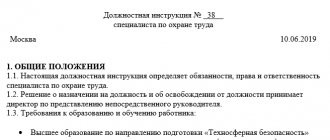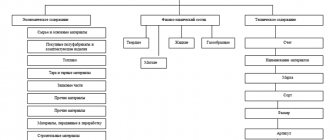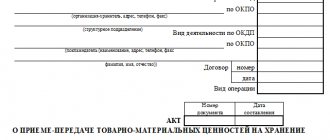Law on the dismissal of a financially responsible person
Any relationship, including labor relations, is no exception; sooner or later they can be broken.
The dismissal of an employee, regardless of what obligations he has and whoever he is, must occur as required by current legislation. The general rules for dismissal from positions are described in Article 84.1 of the Labor Code of the Russian Federation.
How to calculate an official carrying a mat. responsibility? This question often worries employers. How to make an inventory of assets belonging to the enterprise, how to entrust mat. values that belong to an employee of an organization to another person? Is it possible to reduce the staffing level that is responsible for the values entrusted to it, etc. We will try to answer these and other questions today.
Features of responsibility
The employee's financial responsibility must be specified in the employment contract. Its procedure is established by agreement between the parties. The employee may answer:
- for the safety of the company's monetary assets;
- for vehicles and equipment of the company;
- for financial transactions of the company, act under a power of attorney on behalf of an individual entrepreneur or legal entity.
The list of employees who may bear responsibility of this nature is indicated in the Resolution of the Ministry of Labor No. 85 of December 31, 2002. According to Letter of Rostrud 1746-6-1, employees not specified in the Resolution cannot bear such responsibility. The terms and conditions specified in the employment agreement can be challenged administratively or judicially. An employee may bear limited liability in the amount of the average salary received per month - on the basis of Art. 241 Labor Code of the Russian Federation. It is possible to dismiss an employee without taking inventory.
Responsibility for material assets is specified in laws, local acts of employers, collective agreements and employment contracts. An employee may be required to pay a fine and bear disciplinary liability for misconduct, including damage to equipment. Financial liability may be borne by the head of the company, chief accountant, engineer, specialist, or head of the economic department of the company.
Important! It is prohibited to illegally dismiss an employee, including a pensioner, under fictitious pretexts. It is not allowed to impose fines that are not provided for in the employment contract and the law.
The procedure for transferring values
There are two generalized models for the transfer of values, and neither is standardized by law .
- The first is that a candidate for the vacant position that is being vacated has not yet been found.
- The second is that there is already another employee ready to start work the next day after the predecessor leaves the position.
Let's consider the first model. It is clear that the work related to maintaining the organization’s property cannot be entrusted to the first person who comes along. Therefore, finding a candidate may take some time. Under such conditions, it is worth looking for a replacement among the company’s employees.
ATTENTION! Valuables should not be transferred to employees with whom it is impossible to conclude a full agreement. responsibility. Such a mistake can cost the employer dearly. The legislation does not allow the employer to enter into an agreement with all employees of the enterprise.
If the agreement was signed with an employee of the organization, whose job responsibilities (work performed) are not on the list set out in the said resolution, the employer will not be able to hold him accountable and recover damages from him.
You should not transfer valuables or enter into an agreement with a person who is not officially hired for the position.
- Before dismissal, the employee transfers the valuables to the commission, which conducts an inventory.
- The room where material assets are stored (a safe with monetary values) is sealed by the commission.
- The next day, after the dismissal of the previous employee is formalized, a new one is hired and the valuables are transferred to him.
It is this kind of procedure that is provided for by the legislation of the Russian Federation.
You can learn more about changing a materially responsible employee and transferring his responsibilities to another here.
To solve your problem, contact our lawyer via online chat. #Stay home and good health to you!
Ask a Question
What difficulties may arise
Reduction
In essence, the procedure is the same as laying off other employees. True, when a financially responsible person is laid off, the period from which the “countdown” begins increases - this is two months.
During this period, you not only need to have time to check the safety of the valuables and take care of who they will be transferred to, but also notify the employee about the impending changes in the organization (with an official document for signature) - Article 180 of the Labor Code. Besides:
- an order is issued to create a staff reduction commission;
- it is determined who has the greatest advantages to be retained in the company;
- an order to reduce staff is issued;
- the employee is offered (in writing) equal positions in the same company, and he should not lose any salary. If none of them are suitable, the person being laid off must write in his own hand that he refuses the proposal and sign;
- the trade union is notified;
- a dismissal order is issued (subject to personal review and signature);
- final settlement.
Without working off
The notorious “two-week service” is perceived by many as an axiom, although no one can say for sure in which article of the Labor Code such “duty” is approved. How to resign from MOL without working off?
The fact is that the Labor Code does not contain such a rule at all. It is said that an employee who wishes to leave, no matter what obligations he has, is obliged to notify the director about this no later than two weeks before the planned departure.
The following are also considered significant reasons:
- the employee entered an educational institution (for which he provided documents);
- the employer violated the terms of the contract;
- the employee moves to another city;
- retirement (it doesn’t matter whether it happened on time or whether a working pensioner quits);
- disease.
However, in case of illness, you must provide your written consent to carry out the inspection and transfer of valuables to another person without your presence.
You can, of course, not transfer them. But then, if damage is discovered, you will have to prove to the court that you are not involved.
Attraction to mat. responsibility is one thing. You also need to seek compensation. And for this you need good reasons. One way or another, everything must be written down in the employment contract when accepting the position of a responsible person. Positions can be different, ranging from seller, cashier and driver, military personnel and supply manager.
Without inventory
In general, inventory, its implementation, the procedure for drawing up an act and evidence - all these concerns lie with the employer. It is he who needs to take measures in order to issue an order, to form a commission to familiarize the employee with the act, so that at least two witnesses are present.
And so that the amount of damage or shortage corresponds to reality (accounting documents are used for calculations, and wear and tear is also taken into account).
The question inevitably arises: is it possible to “skip” this kind of check when leaving an organization?
Yes, if:
- the employer missed the deadline or did not issue a shortage order at all;
- this is not stated in the contract;
- the liability agreement was not signed at all.
If the inventory procedure itself was carried out with violations, then the inspection is invalid and no matter what the results emerge, they cannot serve as a basis for loss of confidence in the dismissed person.
It is impossible to force the dismissed person to participate in the verification after the fact (that is, after receiving the payment). This is permissible only on the basis of the dismissed person’s own desire.
Dismissal of a financially responsible person in case of shortage
A shortage is not a reason to refuse dismissal. True, its detection is associated with certain difficulties and can extend the two-week “finish line.” However, in any case, an inventory must be made on the basis of a written order from the director.
Next, an internal audit is carried out to establish that it was the employee’s behavior that led to a lack of values. After this, the results of the inspection are provided to the employee and a written explanation (Article 247 of the Labor Code) of what happened is required from him. The requirement may not be fulfilled - then a corresponding act is drawn up.
Further, everything will depend on whether the employee agrees with the commission’s conclusions or not. If yes, then the shortfall is recovered from the salary. If not, then you should look at the amount of damage suffered by the organization:
- the director requests through a written order (if the amount is not higher than the average monthly income of the employee - Article 248 of the Labor Code;
- the amount is recovered by court.
That is, it becomes clear that discussions about the impossibility of dismissing a person who is entrusted with material obligations are nothing more than words. It is only necessary to carefully follow the procedure prescribed by law - only in this way can the actions and claims of the employer be considered acceptable.
How to leave a position of your own free will?
Now, in more detail about the procedure for dismissing a financially responsible person at his own request. To resign from a position on your own initiative, you must follow this procedure:
- the employee must notify the employer in writing at least 14 days in advance (unless there is a valid reason for exemption from work);
- further, the commission, in the presence of the financially responsible employee leaving his post, must take swear words from him. valuables and take inventory. If a deficiency or damage to property is identified, a report is drawn up;
- the employer, in turn, must draw up a dismissal order;
- on the last working day, the employee is given a work certificate against signature and the final payment is made to him.
Even if a shortage is identified, the employer does not have the right not to give the employee the work permit. If the employee does not agree to pay the shortfall, the employer has the right to go to court.
An employer cannot help but fire an employee of his organization until he has transferred valuables. The procedure for dismissing a financially responsible employee certainly has its own characteristics, but the grounds and execution of personnel documents are standard, as for all other employees. And it doesn’t matter who initiates the dismissal: the employee or the employer.
EXAMPLE:
The employee submitted a letter of resignation of his own free will. After the two weeks required in this case, the employer must pay the employee off. The position “I’ll fire you when you hand over the valuables received” is a direct path to a lawsuit, since there is a violation of labor laws.
The Labor Code of the Russian Federation (LLC) does not link the right of an employee to quit at his own request with any production circumstances: the need to complete a project, complete negotiations, hand over received valuables.
Organizing the transfer of valuables is the employer’s task. Of course, this also takes time.
We discussed earlier what a financially responsible person means and the list of positions falling under obligations. You may also find other materials useful on how to:
- a financially responsible person is appointed;
- an order is drawn up to appoint such an employee.
Legislation
Since, from the point of view of the legislation of the Russian Federation, the dismissal of a materially responsible person is regulated by the Labor Code of the Russian Federation, before dismissal we recommend that you read the following articles:
- 78 (dismissal by agreement of the parties),
- 80 (at the request of the employee),
- 81 (dismissal at the initiative of the employer),
- and also 84 (termination of employment contract).
The data from our article will shed light on dismissals in different cases, depending on the employee’s employment contract and communication with the boss.
Do you need an inventory?
The circumstances under which values need to be transferred may vary, as will the manner in which they are transferred. However, under any conditions, before the dismissal or change of the person responsible for the property, an inventory is carried out.
It is not permissible to transfer entrusted valuables to any other person under a deed without conducting a complete inventory.
Property inventory is the only way:
- establish what and how much value is transferred;
- record the quantity and integrity of existing values.
So, as we see, without an inventory of property, it is impossible to change the person responsible for its safety.
ATTENTION! The provision applies to all organizations and is absolutely independent of their legal form and form of ownership.
The employer carries out an inventory not only to comply with the requirements established by law. First of all, this is a way to protect the financial interests of the enterprise itself.
The inventory should be carried out in the presence of the financially responsible official and the commission that accepts the valuables from the employee.
You can find out who is the financially responsible person before conducting an inventory in this article.
Algorithm
The Ministry of Social Policy draws attention to the fact that before accepting another official for a position, it is necessary to release the one who occupies it, and proposes the following sequence of actions for the release of the materially responsible official:
- The financially responsible person transfers the valuables entrusted to him to another employee according to the act.
- The head of the enterprise issues an order on the temporary appointment of this employee (he must belong to the same category of personnel). An agreement is concluded with an employee of the organization and valuables are transferred to him according to the act.
- They hire a new employee and sign a contract with him. The temporarily appointed employee transfers the valuables to the newly hired employee under the act.
In such a situation, you will have to take inventory twice and draw up two acts. The algorithm of actions will be as follows:
- We determine the employee who will perform the duties.
- We obtain the employee’s consent to perform such additional work on a part-time basis.
- We carry out an inventory, the employee is released and transfers the property to another employee of the enterprise according to the act.
- We formalize the dismissal of an employee with financial liability.
- We assign another employee of the company to perform additional work on a part-time basis.
- We conclude an agreement.
- We are looking for a new permanent employee.
- We carry out an inventory.
- We cancel the combination.
- We are hiring a new permanent employee.
- We conclude an agreement.
- The replacement employee transfers valuables according to the act.
According to the second model, when a successor has been selected for the position of the materially responsible official, the procedure can be simplified.
Step-by-step instructions on transferring valuables to another employee can be found here.
Who is included in this category?
Materially responsible persons include the following:
- Controllers and cashiers or employees who perform their duties.
- Employees who perform depository work, as well as various examinations and inspections, including securities, money, jewelry or other valuables.
- Employees who are involved in issuing operations, as well as storing, recording, issuing or destroying bank cards (discount, credit, etc.).
- People performing collection work (transporting money and other valuables).
- Managers, administrators, as well as other managers or directors of firms and enterprises related to trade or the provision of services.
- Chiefs and managers of construction companies, as well as offices that perform installation and repair work.
- Managers, managers or heads of warehouses, storage places, pawnshops, etc.
- Heads of pharmacies and other pharmaceutical companies or enterprises, as well as points, divisions, departments, etc.
- Laboratory assistants and methodologists of departments, dean's offices, heads of libraries or archives.
In other words, the concept of “materially responsible person” includes a person who, when performing his work, is supposed to be responsible for certain property of a company, enterprise, organization, etc.
In the event of loss of this property, the person must compensate for damage to the extent specified in the employment contract or legislation.
Is it possible for an employee to leave without working?
An employer can refuse to dismiss an employee only if this issue is agreed upon, but he cannot do this after the end of the warning period that the employee wants to resign of his own free will. It will be necessary to satisfy the employee’s request for urgent dismissal if there are compelling reasons for leaving his position without working off the work required by law.
To solve your problem, contact our lawyer via online chat. #Stay home and good health to you!
Ask a Question










